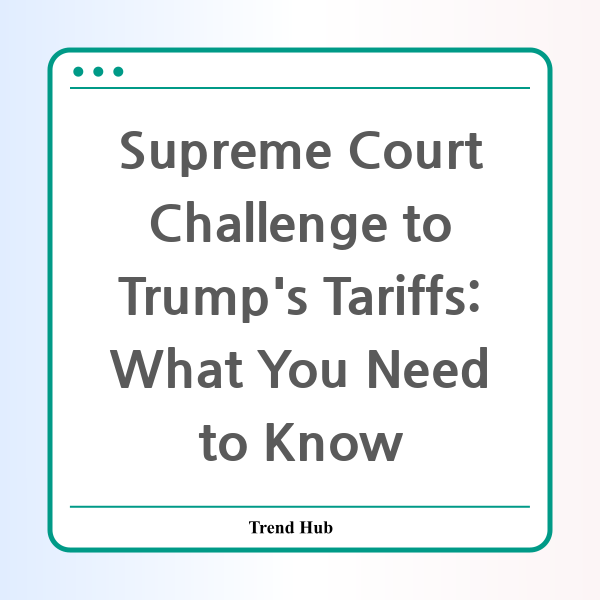* This website participates in the Amazon Affiliate Program and earns from qualifying purchases.

Are Trump's Tariffs at Risk? A Legal Challenge Unfolds
The recent legal challenge against former President Trump's imposition of tariffs has opened a new chapter in the ongoing debate about economic policy and executive power. As a rightwing group, the New Civil Liberties Alliance, backed by high-profile allies like Charles Koch, takes a stand against these tariffs, we explore the implications of this lawsuit and what it could mean for the future of U.S. trade policy.
The New Civil Liberties Alliance argues that Trump’s use of the International Emergency Economic Powers Act (IEEPA) to impose these import tariffs is unconstitutional. They claim that this act is designed for national security measures, not for tariff imposition, thus overstepping the legal boundaries set forth by Congress. This line of reasoning points to a significant political divide, even among traditionally pro-Trump factions.
Understanding the Legal Grounds
The lawsuit stresses that the ability to impose tariffs is primarily a congressional power, not an executive one. The founders of the United States envisioned a system of checks and balances, with Congress having authority over trade policy. According to Mark Chenoweth, president of the alliance, the court's decision will play a crucial role in determining whether this longstanding principle will be upheld or eroded.
The complaint also initiates a critical discussion around the implications of invoking emergency powers. Historically, this practice has been reserved for situations where national security is at stake. The question arises: Is imposing tariffs on foreign goods a legitimate application of emergency powers? Critics argue that the reasons put forward by Trump, including the fentanyl crisis, fail to connect logically to the tariffs imposed.
Political Reactions: A Divided Right
This legal action underscores a growing unease among some Republicans regarding Trump's tariff strategies. Recent support from notable GOP senators for amendments aimed at rolling back certain tariffs shows that dissent is surfacing among his traditional base. Lawmakers like Rand Paul, who have consistently voiced their concerns about the economic ramifications of tariffs, emphasize the need for a return to legislative oversight and a reduction in emergency rule. As Paul noted, "I don’t want to live under emergency rule…"
Additionally, bipartisan efforts are forming, as evidenced by the introduction of a bill from Senator Chuck Grassley and crossing party lines to impose checks on Trump’s tariff powers. This mounting political pressure reflects a significant shift in attitudes towards tariffs and trade policies among those once considered staunch Trump supporters.
The Broader Impact
The outcomes of this legal challenge and the political fallout surrounding it could have profound implications for U.S. economic policy. If the court rules against Trump's use of the IEEPA for tariffs, it could set a precedent that limits presidential power in trade matters significantly. Conversely, if the courts uphold his actions, it may embolden future administrations to employ similar tactics without seeking legislative approval.
As international markets react to these developments, the stakes remain high. A ruling against Trump could lead to immediate shifts in global trade dynamics. The uncertainty surrounding U.S. tariffs has already contributed to market volatility, and additional instability could have far-reaching consequences for businesses reliant on international trade.
Conclusion: What Lies Ahead
The legal challenge against Trump’s tariffs reflects a larger conversation about the balance of powers in the government and the proper role of tariffs in economic policy. As the case unfolds, stakeholders on all sides will be watching closely, knowing that the implications extend beyond the courtroom and into the heart of U.S. economic strategies and international relations. The outcome could redefine how tariffs are viewed within the legislative framework and potentially reshape future policymaking.
* This website participates in the Amazon Affiliate Program and earns from qualifying purchases.